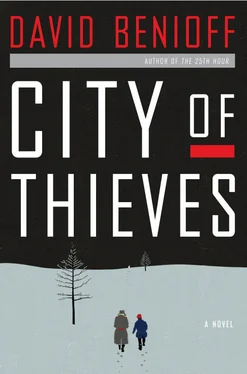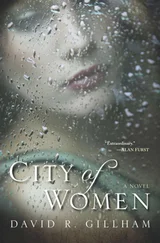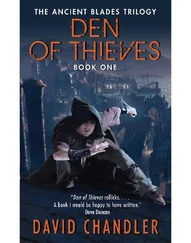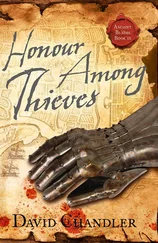“Who are you here to see?” asked one of them, with a librarian’s prim correctitude.
“We’d like to speak to a certain gentleman about his chickens,” said Kolya, choosing honesty for unknown reasons. I expected the girls to laugh at us, but they didn’t.
“He’ll shoot you if you go up there,” said the second girl. “He doesn’t let anyone get near those chickens.”
Kolya and I stared at each other. He licked his lips and turned back to the girls, flashing his most seductive smile.
“Why don’t you let us carry the pails. We’ll worry about the old man.”
By the fifth floor, sweating through all my layers of wool, my seagull legs trembling with the effort, I was starting to regret the decision. There must have been an easier way into the building. We took long breaks at each landing, where I panted and flexed my hands, pulling off my mittens to inspect the deep grooves the pail handles were sawing into my palms. Kolya quizzed the girls about their reading habits and their ability to recite the opening stanzas of Eugene Onegin . To me the girls seemed spiritless, cud chewers, with no mischief in their eyes and no spark in their speech, but nobody bored Kolya. He chatted with them as if they were the most delightful creatures ever to grace a ball, looking one in the eye and then the other, never allowing silence. By the fifth floor it was clear that both girls were taken with him, and I got the sense they were now trying to determine which of them held the upper hand.
A surge of envy rose in me again, that sense of injustice compounded with anger and self-loathing—why did they like him? The long-winded braggart! And why did I begrudge him their attention? I didn’t care about these girls, after all. Neither was remotely attractive to me. This man saved my life yesterday and today I cursed him because girls grew awkward in his presence, blood rushing to their faces, staring at the floor and playing with the buttons on their coats?
But Sonya I liked. Sonya with her crescent dimple and her warmth, welcoming me into her home, offering me a place to stay whenever I needed it, even though one more week without food would kill her—the shape of her skull was too easy to read beneath her near-translucent skin. Perhaps I liked her so much because I met her thirty minutes after seeing the tombstones of the Kirov. Maybe the sight of her kept me from dwelling too much on all my neighbors, trapped beneath the slabs of fallen concrete.
Even when those images slipped through my mind, they lacked barbs, passing cleanly through, and I would find myself thinking again about the colonel’s daughter, or the colonel himself, or the giant chasing us down the steps with his steel pipe, or the woman at the Haymarket selling glasses of Badayev dirt. If I thought about the Kirov at all, it was the building itself that I remembered, my childhood playground, with its long corridors so well designed for footraces, its stairwells with the lead glass windows so layered with dust you could draw your self-portrait with your fingertip, the courtyard where all the kids gathered after the first big snowfall of every year for the annual snowball fight, floors one through three against floors four through six.
My friends and neighbors—Vera and Oleg and Grisha and Lyuba Nikolaevna and Zavodilov—seemed unreal already, as if their deaths had erased their lives. Perhaps I had always known they would disappear one day, and so I had kept them at a distance, laughed at their jokes and listened to their plans but never really trusted their existence. I had learned how to protect myself. When the police took my father, I had been a dumb boy, unable to understand how a man—that willful, brilliant man—could cease to exist at the snap of an unseen bureaucrat’s fingers, as if he were nothing but cigarette smoke exhaled by a bored sentry in a watchtower in Siberia, a sentry who wondered if his girlfriend back home was cheating on him, who stared over the wintry woods, unaware of the great blue maw of sky above him that waited to swallow the curling smoke and the sentry and everything growing on the ground below.
Kolya was saying good-bye to the girls, dropping his pails inside their apartment door and motioning for me to do the same.
“Be careful up there,” said one of the girls, the bolder one, I suppose. “He’s eighty years old, but he’ll shoot you in a second.”
“I’ve been on the lines fighting Fritz,” said Kolya, reassuring her with a smile and a wink. “I think I can handle a cranky grandfather.”
“If you want something to eat on your way down, we’re making soup,” said the second girl. The bold one shot her a look and I wondered, with little real curiosity, if she was peeved at the offer of free food or at the flirtatious gesture.
Kolya and I climbed the final flight of stairs to the roof door.
“Here’s the plan,” he told me. “Let me do the talking. I’m good with old people.”
I pushed open the door and the wind came at us, blowing bits of ice and dust into our faces, the grit of the city. We lowered our heads and pressed forward, two Bedouins in a sandstorm. Ahead of us was a mirage, what could only be a mirage—a shed nailed together with wood planks and roofing felt, the gaps stuffed with scraps of wool and old newspapers. I was a city boy to the bone; I had never been to a farm or even seen a cow; but I knew this was a chicken coop. Kolya looked at me. Our eyes were watering from the wind, but we were both grinning like madmen.
There was a crooked door on one end of the coop with an unfastened hook-and-eye latch on the outside. Kolya knocked softly on the door. No one answered.
“Hello? Don’t shoot us! Ha, ha! Ah, we just wanted to visit with you…. Hello? All right, I’m going to open the door. If that’s a bad idea, if you’re thinking of shooting, just say something now.”
Kolya stepped to one side of the door frame, motioned for me to do the same, and prodded open the door with the toe of his boot. We waited for a shouted curse or a shotgun blast, but neither came. When it seemed safe, we peeked into the coop. It was dark inside, lit by a single wick lamp hanging from a hook on the wall. The floor was covered with old straw that stank of bird shit. One wall was lined with empty nesting boxes, each big enough for a single chicken. A boy sat at the far end of the coop, his back against the wall, his knees drawn to his chest. He wore a woman’s rabbit fur coat. He looked ridiculous but warm.
A dead man sat in the straw beneath the nesting boxes, back against the wall, limbs stiff and splayed like an abandoned marionette. He had a long white beard, the beard of a nineteenth-century anarchist, and skin like melted candle wax. An antique shotgun still lay across his lap. From the looks of him he’d been dead for days.
Kolya and I stared at this grim tableau. We had entered into someone else’s private misery and we felt the guilt of interlopers. I did, at least. Shame didn’t afflict Kolya the way it did me. He walked inside the coop, knelt beside the boy, and gripped his knee.
“Are you all right, little soldier? You need some water?”
The boy didn’t look at him. His blue eyes seemed enormous in his starved face. I broke off a square of the library candy, stepped into the coop, and held out my hand. The boy’s eyes shifted slowly in my direction. He seemed to register my presence and the food in my hand before he looked away again. He was very far gone.
“Is this your grandfather?” asked Kolya. “We should bring him out to the street. Not good for you to be sitting here alone with him.”
The boy opened his mouth and even that effort seemed to cost him. His lips were crusty, as if they had been glued together.
“He doesn’t want to leave the birds.”
Читать дальше












